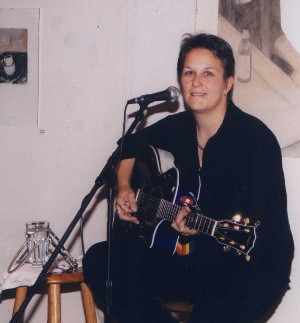 From Thibodaux to Boston
From Thibodaux to Boston
Mary Gauthier at Rosendale Cafe Friday, April 19, 2002
Story by Gary Alexander
Photos by Ray G. Ring IV
The
path of the rapidly rising musician who will entertain at Rosendale
Cafe Friday night has been filled with almost as many twists, turns and
detours as a Congressional investigation.
Mary Gauthier (pronounced Go-shay) first saw the light of day
through the Spanish moss along the banks of the Bayou Lafourche in
Thibodaux (pronounced Tib-a-do), Louisiana. Growing up in what the
town's Chamber of Commerce describes as a "hard-working, fun-loving
culture" as part of a Nixon-Republican family, presented Mary with the
first few squiggles in the highway of life.
Southwest of New Orleans and Southeast of Baton Rouge, Thibodaux's
carnival in Mardi Gras season urges natives to "Laissez Les Bon Temps
Roulez" Cajun style. Their "rubber duck race" sounds as knee-slapping a
time as an Ulster County "cow-chip toss." But, 43 years before Rosendale
was founded in 1844 (as a center which supplied half of all the cement
used in the U.S. through the Delaware and Hudson canals), Thibodaux was
established amidst French and Spanish colonists from New Orleans,
refugees from the French Revolution and the Arcadian expulsion from Nova
Scotia.
This pronounced cultural heritage congealed into a "Cajun style"
which features distinctly flavored music and cuisine in festivities
which charmingly divide the year with periods of celebration. Although
Gauthier's music is styled quite apart from the lusty Cajun traditions
of her homeland- call it alternative folk-country, if you must- we have
cause to suspect that the very
spirit of music infiltrated her youth as
deeply as aromas from the local tables.
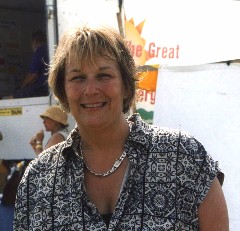 "Music? This whole thing is mysterious, to be honest with you,"
Gauthier said on her cellphone from a Cuban cafe in Key West. "I've
always been a big music fan and I've always been drawn more to words
than anything else."
"Music? This whole thing is mysterious, to be honest with you,"
Gauthier said on her cellphone from a Cuban cafe in Key West. "I've
always been a big music fan and I've always been drawn more to words
than anything else."
If Gauthier seems a bit puzzled as to how her ship sailed into
musical waters, it may be that song was such an intrinsic part of her
early environment that it was most noticeable when it wasn't there. She
wasn't thinking of becoming a musician, she says today, but then why did
she so often have a guitar with her as she roamed about?
"I always lugged a guitar around; more as a prop, though,"
Gauthier responded. "I never really
played it until I quit drinking. I
could play like 3 or 4 chords. I liked the old Neil Young songs and
stuff like that but I never started to learn how to
really play until
much later in life. Not till I was around 35."
Hold on, now. Quit drinking? We've missed a few of those road
loops and detours. Let's turn back the page to that bayou view...
Picture a town in the wetlands which features a state university
named after a Confederate colonel, a national park and a city center
named after Jean Lafite- that legendary scamp who turned the Battle of
New Orleans in Andrew Jackson's favor with his "merry men" and plotted
the rescue of Napoleon from St. Helena. To judge by the city's website,
it seems unlikely that most of the locals are aware of all the
intricacies of their historical heritage. It notes vaguely, for
instance, that "Indian tribes originally inhibited (sic) the area
currently known as Thibodaux as early as 1686" and tells us that
Iberville referred to them as "river people" without providing a clue as
to who Iberville might have been. [The misspelling of "inhabited" may be
due to the local accent. We are also told about eight recreational parks
and a "gulf course."]
But, if they happen to be a little hazy on the historical details
of their region, the good folks of Thibodaux certainly
feel the
influence of the culture it handed down as it saturates their day-to-day
life. If not on today's homogenized radio, they can hear it in their
clubs, on back porches, at their November festival, or a parade in May
which dates back to 1858. It's in the air like the drift of wind across
the sugar cane.
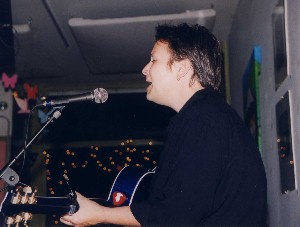 Against this Creole backdrop, in a town that boasts a number of
"Louisiana's Cleanest City" awards, "a quality hospital," a "progressive
police department" and daily "swamp tours," Mary tried to balance an
outgoing, boyish personality with a conservative French-Italian home.
The opening track on her first album tells of a girl who broke her wrist
trying to ramp-jump like Evel Knievel: "When I was a kid I was a
hard-headed, pigtailed tomboy/I make mama crazy cause I won't wear
dresses and bows/I played with boys, and I liked tackle football/I shot
snakes with my brother down at the fishing hole..."
Against this Creole backdrop, in a town that boasts a number of
"Louisiana's Cleanest City" awards, "a quality hospital," a "progressive
police department" and daily "swamp tours," Mary tried to balance an
outgoing, boyish personality with a conservative French-Italian home.
The opening track on her first album tells of a girl who broke her wrist
trying to ramp-jump like Evel Knievel: "When I was a kid I was a
hard-headed, pigtailed tomboy/I make mama crazy cause I won't wear
dresses and bows/I played with boys, and I liked tackle football/I shot
snakes with my brother down at the fishing hole..."
Before long the temperament of a misfit saw her slipping a
teenage body through a window to go off partying with friends. By 15,
she had stolen her mother's car and left home and high school behind.
Gauthier turned 16 in a Baton Rouge detox center and spent another
birthday, two years later, in a cell in Kansas City. When her road
finally straightened out in 1990 and she logged some study of philosophy
at Louisiana State University and culinary arts at a school in
Cambridge, Massachusetts, her empathy for social misfits and underdogs
lingered on in her music.
"I think what happened is that I started out young with a lot
of problems," Gauthier reflected. "I think that drinking and the drugs
got in the way of me becoming a writer. So, I ended up in the restaurant
business, where I could function and still continue to drink. A couple
of years after I put down all mind-altering chemicals, I started
becoming a writer. I think I probably would have been a writer all along
if didn't have the chemical problem, but it held me back. I just wasn't
able to function that way...
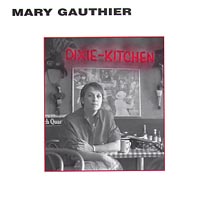
Dixie Chicken |
"It's strange. I could function in a business world but not
in an artistic one because with many people it's the other way
around...I think my study of philosophy was the beginning of sort of a
spiritual search and, certainly, my music is a continuation of that...As
you know, I don't really write pop songs. I'm on a search and I have no
idea of what I'm looking for, but there's a magic to putting words
together that gives me peace and provides sort of a connection to a
mystery that I don't understand."
When Gauthier found herself "whirling around" in the South
with a desire to "try something entirely different," she headed for New
England, thinking you can't get much more different than Baton Rouge and
Boston. Her decision to open a restaurant, Dixie Kitchen (after which
she named her first CD), was another turning point in the road.
The style of restaurant was obvious.
"My family is Italian but even Italians down there consider
themselves Cajun," Gauthier explained. "So they cook spaghetti and
meatballs one night and gumbo the next. That's just the way it is down
there. Now, if you're going to open a restaurant, you need to pull from
something you know. I understand Louisiana and Cajun food. I know the
history of the cuisine, so it was just natural for me to do it that
way."
The next turn in the road, music, Mary sees as a "destiny
thing."
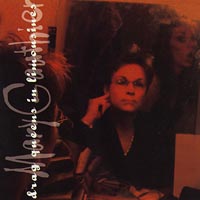
Drag Queens in Limosines |
"I didn't set out to get serious about it. It happened to
me," she recalled. "I was doing well in the restaurant business. I had
insurance. My car was paid for and my car insurance was paid for. I had
bought my first piece of property. In fact, the restaurant was doing
well enough to have my partners seriously push me to open another one
and, in spite of all that, I kept wanting to write. Ultimately, the
writing pulled me away from the restaurant. It seemed to happen all on
its own."
The
Dixie Kitchen
album was a solid start, introducing Gauthier
to a Boston-area acoustic circuit outside of the open mike nights she
had broken in on, but its follow-up
Drag Queens in Limousines,
rattled
windows far beyond the Northeast region. As it gathered rave reviews,
nominations and awards (including Independent Artist of the Year), Mary
found herself entertaining at clubs and festivals coast-to-coast
alongside some of the most celebrated names in the art. When it was
released in Europe by Munich Records last year, Gauthier followed with
four European tours.
Some reviewers, like one in
The Boston Globe,
saw her as "a
female version of John Prine" and one can find some justification for
that in the title track and the laid back and friendly coziness of her
southern accent. Here, she sings fondly of subculture denizens who took
in a runaway and afforded her sanctuary upon their couch; "dreamers with
big dreams, poets and AWOL marines, actors and bar flies" and, of
course, "drunks that philosophize."
On one of the more passionate tracks we find "mercy in the sky"
for Karla Faye Tucker, a woman executed in Texas a few years ago after
15 years on death row. On another we revisit the ghost of a drinker
staring at the wall and sipping her life away just for something to do.
On "Lifetime," we find time slipping through our fingers- even without
the numbness of alcohol- in "no time at all," as mama says on the phone;
life moves so fast, it's hard to see. Here we have gently laced traces
of a Cajun feel behind the words from down home, just a whiff on the
breeze as stories return along the wire of someone's jar of time emptied
by AIDS or cancer as loved ones look on. It is Time as a hand which cups
us all, squeezing...
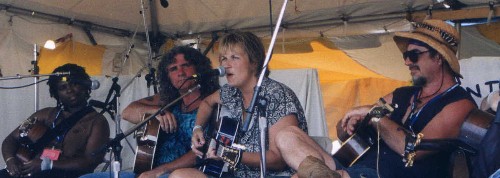
Sharing the Songwriter's stage with Greg Brown
at Winterhawk 2001 |
|
"I love the process," Mary says of her songwriting. "It's more
meaningful to me than making money, I guess, or I wouldn't have left the
restaurant. I enjoy
the process
immensely. In fact, that's why I'm down
here in Key West. Besides fishing and smoking cigars, I'm writing the
next record."
With her third album,
Filth & Fire,
in the can and set for a
European release in April as she ponders her U.S. options, Gauthier is
already casting her lines for the next one. She explains that a title is
usually the first part of a song which occurs to her.
"Once a title comes to me, I try to write that song," she
said, elaborating that today she was helping out on a friend's charter
boat, fishing as much for song ideas as for sea bass. "A title is that
little piece of string that I pull that leads me to the song. If I have
a title, I try to write it. When I don't have any, I like to come down
here and spend time bumming around. Right now, I'm eating a $3 breakfast
because it's the cheapest in town, drinking a cafe con leche and just
kind of floatin'...That state of mind works great for coming up with
song ideas- puts me in a peaceful place where I can relax and just be a
writer. In that way, I'm sort of inducing it and it's a very nice way to
live, too. I did the restaurant routine for ten years. I don't want to
do that again. This is more interesting to me now."
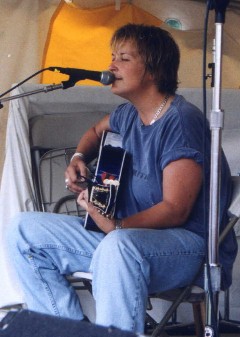
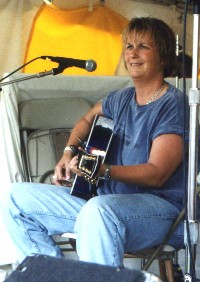 Coping with time creatively, dancing with the muse, also
takes a developed sense of balance. A path through the world of music is
filled with unexpected twists and unpredictable changes of progression.
The only true consistency artists can anticipate is their own and that
must be evolved and nurtured. A performance in a sold-out arena can be
followed the very next night with a booking in a small club with no
guarantee.
Coping with time creatively, dancing with the muse, also
takes a developed sense of balance. A path through the world of music is
filled with unexpected twists and unpredictable changes of progression.
The only true consistency artists can anticipate is their own and that
must be evolved and nurtured. A performance in a sold-out arena can be
followed the very next night with a booking in a small club with no
guarantee.
"There's an awful lot of surprises," Gauthier concedes.
"Every day is completely different than the one before...I was used to
getting up a six in the morning, going to the restaurant, working 10, 12
hours and going home. There was a routine and predictability about it.
In the music business, you just don't know what's next. You don't know
where you're going to be appreciated or where you're going to be ignored
and you're doing the same thing. You're the same person in both places.
There's just a completely unpredictable path out there for an artist and
something about that is incredibly challenging to me. You have to find
peace in uncertainty. That's the biggest thing I didn't realize I'd be
getting myself into...You have to be able to be centered in the middle
of complete and profound uncertainty."
One certainty to start with is that when Mary Gauthier played at the
Rosendale Cafe on a memorable evening in the Fall of 2000, we were all
on our feet applauding at the end and everyone who had come left with
a profound certainty about her talents.
-Gary Alexander
Gary Alexander
is an independent journalist and scholar whose focus of
interests range through a variety of disciplines. Under various names,
he has written (and ghost written) upon history and current event;
science and technology, as well as music and the arts in books and for
national periodicals. While particularly attentive to the subtle and
complex impact upon cultural imagination and contemporary structures of
presumption which activity in the above mentioned topics tend to have,
Alexander treats his topics with a slightly more than occasional resort
to humor.
Posted on April 19, 2002
|

